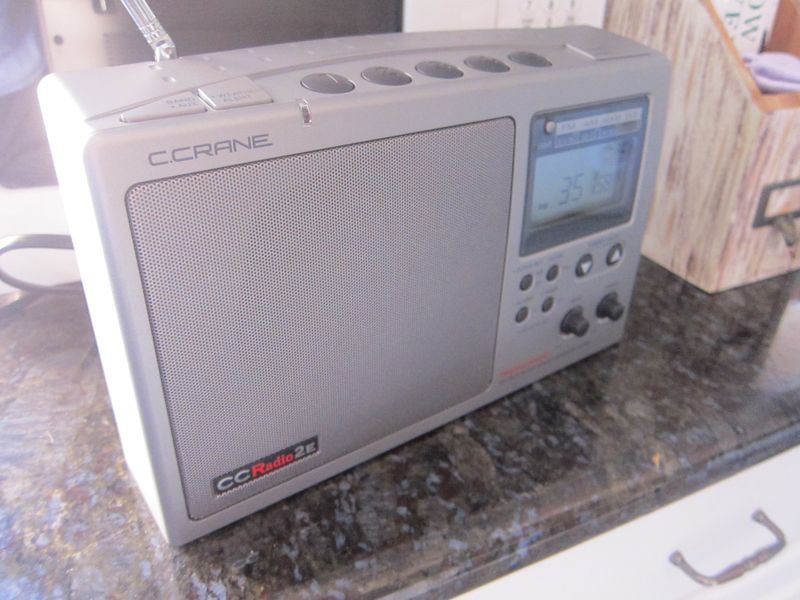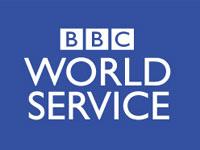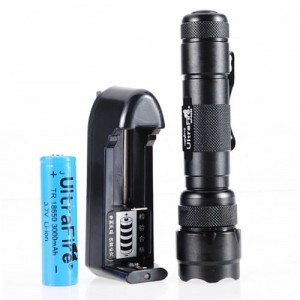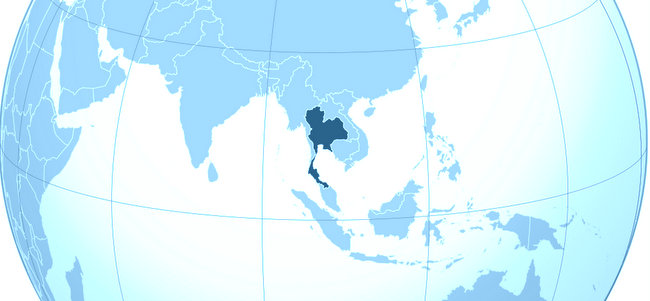 Searching for an AM/FM radio great audio? Check out Jeff’s first look at the CCRadio 2E.
Searching for an AM/FM radio great audio? Check out Jeff’s first look at the CCRadio 2E.
Yearly Archives: 2014
Remembering BBC Ottringham on Memorial Day
Many thanks to SWLing Post reader, Jonathan Marks, who shares this amazing story of the BBC Ottringham (a.k.a. OSE5) broadcast site.
Since Ottringham was an active transmitting site during in World War II, it makes for a fitting tribute here on Memorial Day.
On his blog, Critical Distance, Jonathan writes:
“Few people know that Ottringham, a village near Hull in the UK was the home of many of the BBC’s broadcasts during the Second World War, and that its transmissions were received well into the heart of occupied Europe. The site was intended to broadcast both medium and long wave services to counteract propaganda coming from Nazi occupied Europe. Today the site of the old transmitter site is an engineering works and the fields where the antennas stood reveal little of their radio past.”
I have embedded the BBC documentary of Ottringham below, but ask that you visit Critical Distance for two others Jonathan has posted (including one from his days at Radio Netherlands). Thanks again, Jonathan!
Thailand Coup: BBC World Service increases shortwave broadcasts
Many thanks to SWLing Post reader, Richard Cuff, for forwarding this press release from the BBC World Service Group Communications:
BBC World Service increases broadcasts to Thailand

26 May 2014. As authorities in Thailand take key national and international channels off air in the country, BBC World Service has increased its shortwave English-language radio broadcasts to Thailand, to continue the delivery of its independent news and analysis to audiences there.
From 01:00 GMT on Monday 26 May, BBC World Service expanded its availability via shortwave to Thailand by adding [ten] hours of broadcasts to its daily shortwave schedule (all times GMT):
- 01:00-03:00 on 11,600 kHz
- 03:00-05:00 on 7,370 kHz
- 05:00-11:00 on 11,700 kHz
Acting Director, BBC World Service Group, Liliane Landor says: “In times of national crisis, there is an acute need for accurate, trusted and impartial news. This is why, with our international TV news channel off the air in Thailand, we have increased BBC World Service radio broadcasts in the country.”
The above transmissions add to BBC World Service’s six hours of shortwave broadcasts at peak times for Thailand.
Ends//
For more information about the military coup in Thailand, and how it affects international broadcasting, please follow our tag: Thailand Coup
[Update 27 May 2014: Number of broadcast hours corrected. HT to Dan Ferguson and Richard Cuff]
The Tecsun PL-660 and PL-880 groups have disappeared?
I’ve gotten messages from several readers over the past two days noting that the Tecsun PL-880 and PL-660 Yahoo groups have vanished. It’s a shame as these sites have a treasure trove of information in their archives.
When I look through my Tecsun PL-880 archived emails, I see that the last message from the group was dated May 24th, 2014: two days ago.
The last thread contained some heated discussions that got quite personal between group members.
It can be a tough call for group moderators to step in and ask for a discussion to end or to ban a member from the group. You’ll notice (or perhaps not) that I rarely moderate comments on the SWLing Post.
Aside from blatant SPAM, there have only been perhaps two or three comments I’ve moderated in the many years this site has been online. In those cases, commenters were posting personal attacks. I wrote to the commenters and explained why I removed their comments; only one persisted, so I banned his IP address from posting future comments.
With that said, I’m so proud of the community of readers and SWLs here at the SWLing Post! I’ve made some great friends through this site and have learned so much from our many readers.
How many readers? The SWLing Post averages about 2,500 daily readers and 120,000 monthly page views. In 2008, I could have never imagined…
Thank you!
An inexpensive battery charger for the Tecsun PL-880
 Many thanks to SWLing Post reader, Steven, for sharing this very affordable battery charger for the Tecsun PL-880 batteries. Steven writes:
Many thanks to SWLing Post reader, Steven, for sharing this very affordable battery charger for the Tecsun PL-880 batteries. Steven writes:
“I never purchased a stand-alone 18650 battery charger for my Tecsun PL880 radio because I felt the in-radio on wasn’t good enough. With several batteries it became a bit more of a problem keeping track and setting time aside to use the radio as a charger. Anyway, I came across amazing deal from Amazon that I just purchased.
For $9.68 out of pocket including slow shipping you get a super bright flashlight claimed to be 1000 lumens, which is probably a bit overrated. It also includes a double cell 18650 charger and one 3000ma 18650 battery – probably overrated too but all for under $10. I couldn’t pass it up.”
I will pick up one of these chargers, too. Like you, I find that sometimes I would like to be listening to the radio instead of using it as a charger. I especially love the size of this charger–might just fit in my radio go bag.
Thanks again, Steven!
Budget cuts threaten Radio Australia: how you can help
 The Friends of the ABC have asked for your help to support Radio Australia.
The Friends of the ABC have asked for your help to support Radio Australia.
In short: the ABC (Australian Broadcasting Corporation) is trying to cope with a 60% cut in funding resulting from the loss of the Australian Network contract. There are fears that Radio Australia could be cut significantly as a result; after all, the number of Australians listening to Radio Australia domestically (either online or via shortwave) is very low.
Those of you who followed the Canadian Broadcasting Corporation‘s cuts in 2012 will remember that Radio Canada International was consequently dealt an unfair and crippling budget cut. I believe the Friends of the ABC’s fears are not unfounded.
Below, you’ll find the message from Friends of the ABC with contacts to send your letters of support:
Please take a few moments to write to the Managing Director of the ABC in support of the staff of Radio Australia, who are facing a 60% cut in funding, not by the government directly, but by ABC management!
-Mal Hewitt – President, Friends of the ABC NSW
Message from Jemima Garrett, Pacific Economic and Business reporter, ABC Radio Australia:
“As a long term member of ABC staff I am writing to you now because of a new and urgent threat to Radio Australia. As I am sure you know Radio Australia is a vital service in the Pacific Islands reporting on and covering issues that no other media outlet covers. It has huge audience ratings but is often forgotten in Australia because it is not heard here. The cuts to Australia Network are now set to affect Radio Australia as well. In tough time[s,] radio is an inexpensive and effective way of maintaining our expertise so that we are ready to rise like a phoenix when the political environment improves. It is also able to report on more issues, in more depth and more quickly than TV and therefore is an important source for and method of keeping our online offering as rich and varied as possible.”
Please send you views to:
- Managing Director [email protected],
- Director of News [email protected],
- Director of International [email protected],
- Head of ABC News Content [email protected],
- Editor ABC Asia Pacific News Centre [email protected] and
- staff elected Director Matt Peacock [email protected].
Background:
ABC management is looking at how to cope with the budget cuts resulting from the cancellation of the Australia Network contract. This doesn’t just affect Australia Network but may result in substantial cuts to Radio Australia as the ABC tries to use some of the money it still has for radio to keep some TV programs, contracts in Asia, the mobile and online services connected with Australia Network going too. The scale of the cut is huge – 60 per cent of our budget has been lost ($21 of $35 million a year). This is for broadcasts to a geographic area ranging French Polynesia in the east to India in the west and FSM and China in the north. (Jemima Garrett, Pacific Economic and Business reporter, ABC Radio Australia)
Boston pirate radio: a “vital resource” in minority neighborhoods
 Many assume that pirate radio operators only exist to interfere with commercial broadcasters–this couldn’t be further from the truth.
Many assume that pirate radio operators only exist to interfere with commercial broadcasters–this couldn’t be further from the truth.
Indeed, there are few “jammers” on the air; most pirates broadcast on unoccupied frequencies and play content that isn’t widely available on the commercial airwaves.
Many thanks to Mike Hansgen for sharing this article from The Boston Globe which takes a sympathetic view of FM pirates who had served minority communities–at least, before they were shut down by the FCC:
“Although illegal, such radio stations are a vital resource in immigrant and minority neighborhoods that are underserved by commercial mainstream broadcasters, advocates contend. In addition to playing music with an ethnic flair that’s heard nowhere else on the dial, many unlicensed community radio stations feature talk programming that encourages listener participation on topical issues such as immigration, local and international politics, and sports from back home.
“It’s sad to see that [federal agents] shut them down, because even though they are pirate stations, they truly are the main source of communication in those communities,” said Yessenia Alfaro, director of organizing at Chelsea Collaborative , a social justice nonprofit. “It certainly has a negative impact when they shut these down. They are the main outreach vehicle for people who speak a different language.”
Some outfits, like Radio Uganda Boston in Waltham, opt to have an online presence outside of radio, but many new immigrants and low-income families have no access to computers or can’t afford the monthly bills for Internet access, Alfaro said. Many also cannot read, even in their native language, rendering radio the only source for information, she added.
Despite the potential for tens of thousands of dollars in fines and seizure of transmitting equipment, “pirates” continue to take the risk in order to serve the underserved, said Bruce Conti, a longtime radio enthusiast from Nashua and the international radio columnist for the National Radio Club magazine DX News.
Even if they have tried to operate legally, most individuals have been priced out of potential station ownership under relaxed FCC rules that have the majority of radio stations owned by large corporations, like Clear Channel and CBS, Conti said in an e-mail. There are also no available open broadcasting channels to be had in Greater Boston.
“So an interested buyer can only wait for an existing radio station to become available/for sale, again driving up the cost of entry,” he wrote. “Licensed commercial radio stations in the Boston metro area have abandoned service to the inner city, so most . . . pirate radio stations in Boston are filling a void.”



